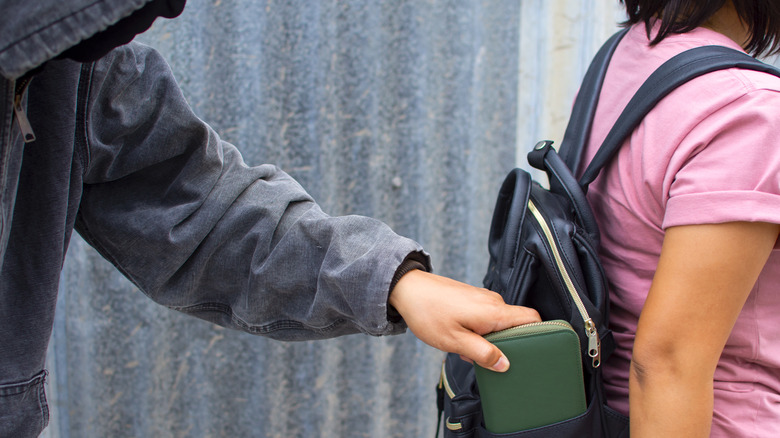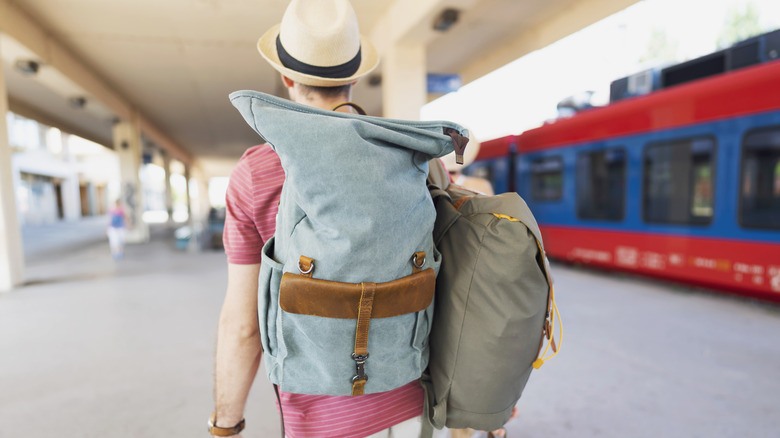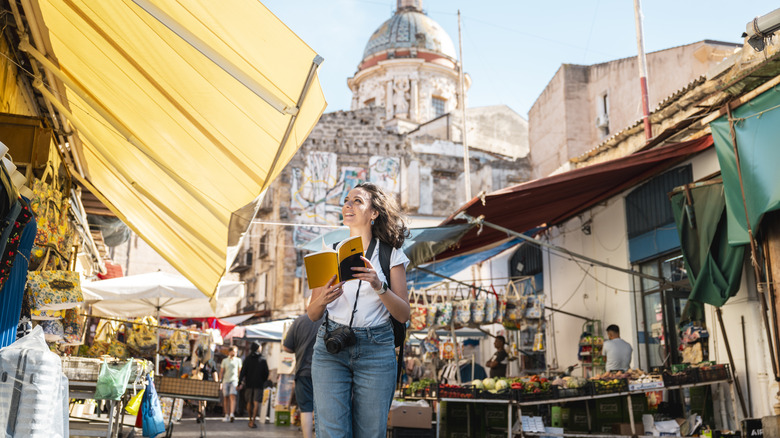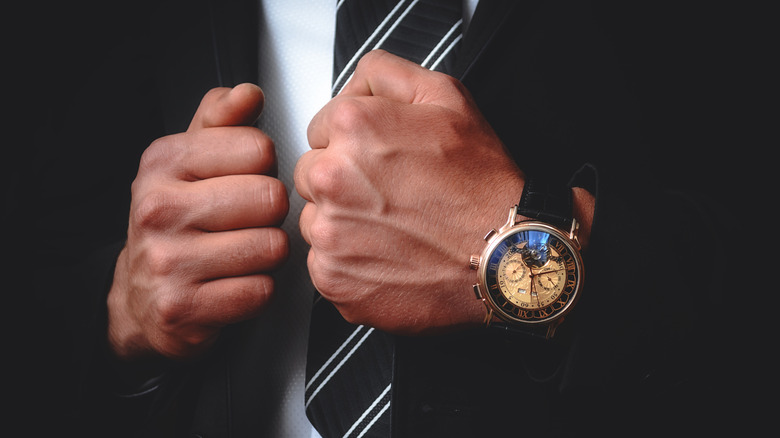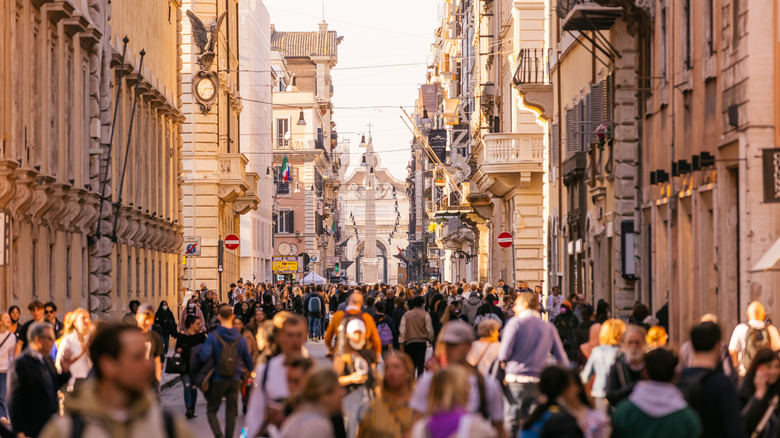The European Country With The Worst Pickpocketing And How To Avoid It
We may receive a commission on purchases made from links.
According to a 2024 study by travel insurance comparison company Quotezone, a ranking of the top 10 tourist destinations where you are more likely to be pickpocketed includes nine European countries, and Turkey. Depending on which part of the country you're referring to — the majority of Turkey is considered part of Asia Minor — even this could be classified as at least partially European due to a border beginning just inside the South Eastern part of Europe. Quotezone found the number one European country you're most likely to lose your purse or wallet is Italy. As a UK company, their stats follow accordingly, showing an estimated 478 UK tourists per million experiencing a pickpocketing incident as of April 2024. Italy made it onto a separate list in a 2009 TripAdvisor ranking, where it was second place behind Spain. Now in third place, with a rate of 111 pickpocketing incidents per million UK tourists in 2024, Italy now has four times the amount of reported pickpocketing incidents of Spain.
Even social media reflects this, with the hashtag #pickpocketsitaly revealing a litany of pickpockets in action throughout various Italian cities. In 2022, a law putting the onus on the victim to both report and show up to the subsequent trial of a pickpocketer, called the Cartabia reform (riforma Cartabia), has potentially emboldened these criminals since their charges can be erased otherwise. To that point, the onus may be on you to protect your valuables from pickpockets.
Here's how to carry things without being an easy target
When people think about clothes and accessories in Italy, it's usually the finely tailored fashions of Milan's runways. According to the Italian National Police, wallets placed in back pockets, easily accessible bags, and hand bags taken right off the shoulders of tourists — which can happen quickly with the assistance of mopeds, motorcycles or cars — make tourists easy marks. For starters, these are places you should never keep your money when traveling, especially since technology has come up with better places for you to do that.
An old school solution is a money belt, strapped around your waist and concealed under clothing. The Raytix RFID Money Belt on Amazon has hidden pockets for coins and compact items but is large enough to accommodate money or a passport. The mesh pockets make the belt breathable and relatively comfortable. The RFID component blocks high tech thieves' ability to digitally scan credit or debit cards carried inside them, and it will only set you back around $23. Another solution is an anti-theft bag, equipped with zippers and slash-proof straps that lock, and the aforementioned RFID blocker built into the bag to protect your digital assets. While there are common sense things you should never carry in your wallet while on vacation — things like check books or multiple credit cards — a bag built to thwart pickpockets' physical and virtual attacks can offer you a little more confidence.
This is why you should be confident yet aware
If you don't want to have to figure out what to do if your credit card is stolen in Italy, pay attention to your surroundings. According to a 2015 study courtesy of the American Academy of Orthopaedic Surgeons (AAOS), 78% of U.S. adults thought distracted walking was a major issue, with 98% saying they see people talking on cellphones, 83% listening to music, or 85% engaged with their smartphone. This is a serious tell for a professional pickpocketer, as they tend to strike when you appear to be trying to figure something out — like transitioning from a gondola or train onto the street — or when you're just otherwise distracted. Confidence expressed by just appearing to have your wits about you even if you're jetlagged, impressed by the architecture, or lost, also helps make you less of a target.
Even in Italy, the Baltimore Police Department offers advice on confidence that you can take with you to Italy or anywhere else in Europe. Walking at an even pace, eyes up and hands relatively free of bags, as well as not listening to music or staring into your cellphone while walking exudes both confidence and awareness. Knowing who is around you, particularly suspicious looking individuals in front or behind you, will also help you stay safe. Pickpocketing is a scam you need to watch out for, which is easier to do if your eyes aren't glued to your phone.
Here's why you should leave your Rolex at home
Thanks to the rise of social media influencers, people have been given the idea that wealth is something to be shown or flashed. What those people often don't realize is that the lifestyles being shown to them are often paid for with credit cards. True wealth doesn't need to be bragged about or displayed, especially when you're out of your element. Emulate this principle. Nothing says "easy mark" to a pickpocketer than someone literally wearing their net worth. Make use of your hotel safe, as leaving things out in the open, in a drawer, or under your mattress are some of the worst places to keep your money. The safest move is to not bring the pricey jewelery on vacation at all.
Where cash is concerned, alongside the anti-theft bags or money belts, lean into technology like digital wallets. You can even store identification like your passport in an Apple Wallet, for instance. Of course, now you'll just need to really keep an eye on your phone. While the financial architects of our times are busy deciding how quickly the future of digital payments could lead to the world going cashless, Italy is going through a cultural shift. Although the country still favors debit cards and cash, Google Wallet, Skrill and Apple Pay are all becoming popular forms of digital payment, with contactless card payments having a limit of 50 Euros.
Here's where and how to know when pickpockets are targeting you
A big factor in the odds of being pickpocketed is knowing where and how it's more likely to happen. Unlike the advice most local or international law enforcement give about avoiding crime — like staying in areas with lots of people — where pickpocketing is concerned, that's horrible advice. Large crowds like those found in public transit hubs, airports, and tourist traps, provide pickpockets with their best opportunity to steal your things. Of those tourist traps, the Pantheon, Colosseum, and Trevi Fountain in Rome, the Gallerie Degli Uffizi in Florence, and the Duomo di Milano in Milan rank high in places you're most likely to be pickpocketed. Transit hubs like the Cinque Terre train lines connecting to the villages Levanto, Monterosso, Vernazza, Corniglia, Manarola, Riomaggiore and La Spezia, and the the Circumvesuviana train to and from Pompeii and Sorrento in Naples, are also likely spots to lose your wallet if you're not paying attention.
Pickpockets employ tricks that begin at the psychological level, which, according to a BBC interview with neuroscientist and author Susana Martinez-Conde, relies on overstimulating your attention system by redirecting your focus toward something other than the pickpocketer. This is why pickpockets often work in teams, with one person maybe bumping into you and spilling their cappuccino on your new shoes, while the other steals your wallet. If a stranger attempts to distract you, keep your hands on your wallet and keep moving.
